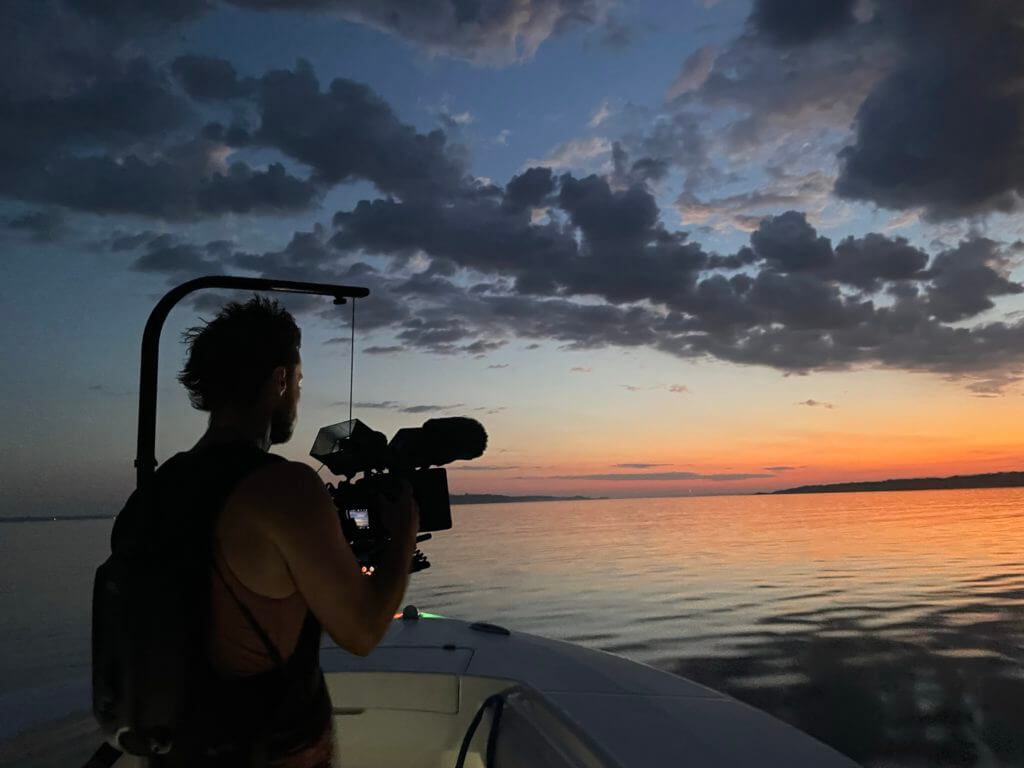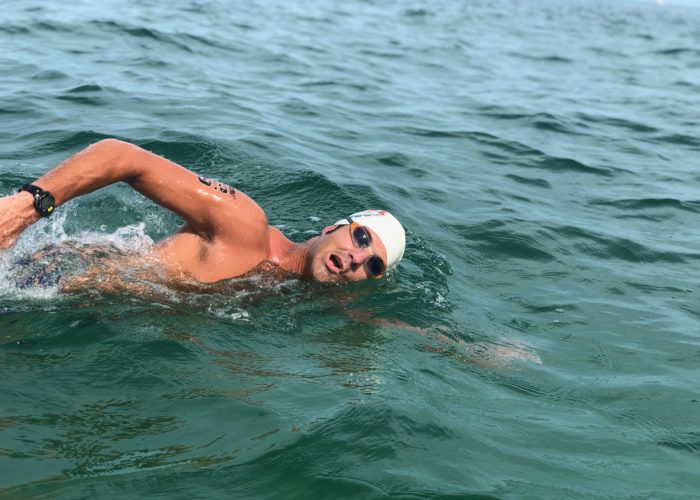Ben Tuff to Release Documentary: ‘Swim Tuff: How I Swam My Way Out of the Bottle’

Ben Tuff had hit rock bottom.
Eleven years ago, he knew he had to get sober. Needing something to jumpstart his recovery, he decided to start swimming.
And he hasn’t stopped.
Tuff, 42, has been near the water ever since, and will release a documentary called “Swim Tuff: How I Swam My Way Out of the Bottle,” which will be released on June 13.
“I had been hiding the drinking for a while. I would go to the liquor store and get a bottle of vodka and mix it with vitamin water. I was taking eight ounces at a time. I did my best to convince myself it was vitamin water. My wife had gotten rid of all the alcohol in the house, but I continued to do it,” Tuff told Swimming World. “On April 21, 2012, I had a panic attack in the morning. My wife took me to the hospital. I was hyperventilating. I was in the triage room. I couldn’t leave until my blood alcohol level was legal. My wife was like, we are done. It is either your kids or alcohol. Of course that was an easy decision.”
The documentary focuses on his 25-mile swim around Narragansett Bay, as well as his decade-long journey of sobriety.
“It started 11 years ago. If I didn’t make the choice to get sober then things would get really bad. I got sober and went away to a place called Silver Hill in Connecticut. One of my first sponsors was a badass dude from Ireland and he was a triathlete. He was awesome and (inspired me) to be an athlete. I asked him if he thought I could learn to swim and do these things,” Tuff told swimming World. “So I started to teach myself how to swim the day I got out of rehab. One length turned into two, then after a few months I got to a half mile. I was able to do a race and I loved it. I completed it and I was psyched.
“Then it was go time.”
Tuff entered in six races.
“My sponsor made me sign up for six races. He wanted me to go big. I was pretty decent. I made nationals and performed pretty well. But then I felt like I was doing it for other reasons. I was doing it to beat people,” he said. “But I wasn’t really a runner and I eventually found that the swimming side is quite peaceful. I can process things and do it my way with my time.”
The reflection is something he didn’t allow himself to do when he was drinking. He just buried everything in a bottle. Now the water has changed that.
“I swim a lot on my own. That is where I do find the most time to decompress and get through everything I need to in my brain,” Tuff said.” The things that I used to drink over and try to erase or push down deeper, they came right to the surface when I swam and I was able to work through them.”
As “Swim Tuff” recounts, Ben first decided to raise money for Clean Ocean Access by swimming around the island of Jamestown, a 25-mile effort that raised $54,094 in 2019. The following summer, Ben braved the open, shark-infested waters of the Atlantic Ocean by making the 19-mile crossing from Block Island to Jamestown in 9 hours and 19 minutes, raising $104,136 for Clean Ocean Access.
His 2022 swim, from Providence to Jamestown, is the setting of “Swim Tuff,” a gripping documentary filmed by Matthew Corliss, who helped create “The Social Dilemma,” “Chasing Coral,” and “Chasing Ice,” among other award-winning films. Corliss states: “Making Swim Tuff was unlike making any other film I’ve made. The sheer scale of one person swimming as far as Ben swam, the people surrounding Ben and the preparation for such a day were nothing short of incredible. People are capable of so much, and it’s especially inspiring to see those capabilities manifest after such a long battle with alcoholism.”
“I wanted to take things up a notch. I started to do some longer swims. It started with the save the bay swim from Newport to Jamestown,” he said. “I looked into other races and found the Race Around Key West. I did it and it was fun. I met some great people. It got me out of my familiar realm of cold water swimming. My brother was kayaking with me. On the way back I told him I wanted to swim around Jamestown Island. We went back to Rhode Island. I went to one of the environmental groups and I wanted to raise money for them. After I finished (20 miles), I saw that Block Island was not that far.
“I was the first person to make that swim.”
He had now found his calling.
“I didn’t do this to make attention, or make a movie to make attention for myself. I did this to show others that they can do things like this and to raise awareness for things. After that, Matt Corliss came to me and asked me about doing a documentary. It was a long project. Matt became a good friend of mine, so his presence was never in the way,” Tuff said. “I was very open about my sobriety. If I had someone to look up to early in my sobriety like this and I related to them (it would have helped). It was so worth it.”
Now he focuses on bringing awareness to Clean Ocean Access.

Photo Courtesy: Ben Tuff
“It is organizations like this that help me be able to swim some of these with clean water,” Tuff said. “I have been able to accomplish three amazing things. No. 1 I have been able to free my mind and have a place to have my own time away from the phone or life issues when I go and swim. Secondly is bringing attention to mental illness and addiction. They are so misunderstood in today’s world. If people knew how prevelant it really was, they would be so surprised. There are so many people yearing for help. It might not be alcohol or drugs, it might be other things. People have eating disorders or are addicted to working out. But asking for help is very difficult. And it is very rewarding to raise money and awareness for a cause.”
It all started with one small but huge step – asking for help.
“I didn’t know how to ask for help. I feel like I did want to get caught. I want to empower people to find those voices of help,” he said. “I think every human being needs a month to concentrate on themselves. I learned so many things and came out of their transformed, with skills I never had to work through bigger issues of life.”
It is something Tuff hopes will be a takeaway from the documentary.
“The essential question is how can I continue to improve my social emotional and physical growth in my life while trying something new?” Tuff said. “It can be a huge change, it can be deciding to swim 26 miles, or it can be a small change—it can be changing your Broutine so you get to spend more time with your child. All of us have the capacity for change and dedication.”
More information at swimtuff.com



